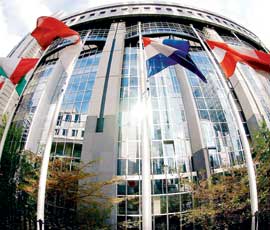New EU budget ‘must not disadvantage UK’

A new compromise paper for the 2014-2020 EU budget threatens far deeper cuts to agriculture and rural development spending than earlier plans. It could also open the way for wider divergence in payments to farmers in different member states.
European Council president Herman van Rompuy drew up the compromise paper alongside Cyprus – which currently holds the presidency – as EU leaders prepare for the budget meeting in Brussels next week.
Described as “disruptive and devastating” by the commission’s agriculture directorate, the paper suggests a further cut of almost 5% on top of the commission proposal for a 12% cut from 2014 to 2020 in real terms.
A new fund to deal with emergencies such as food safety issues would also be financed through Pillar 1, which provides direct payments.
The new figures could mean a cut of more than 20% in rural development funding in many member states. The original commission proposal sought a reduction of more than 10% in rural development spending in real terms during the budget period, while the new paper looks for an additional €8.3bn or just over 9%.
“We are studying what this paper will mean for the CAP, but at first sight it calls into question many of the key elements of our reform proposals and risks the coherence of the future CAP as a common EU policy,” said Roger Waite, spokesman for the commission’s Agriculture and Rural Development directorate.
“It would severely disrupt our system of direct payments and devastate future rural development programmes.”
Only once the budget is agreed can the details of CAP reform be finalised. If the budget deal is done next week then the CAP reform deal could be agreed under the Irish Council presidency in the first half of next year. In theory this could allow implementation of the new rules from January 2014, although observers think this is ambitious.
The new paper also seeks flexibility for member states to shift or modulate up to 15% of funds between the two pillars. This would undermine one of the commission’s key aims, which is to reduce the gap between the value of direct payments in different member states.
In addition, member states would not be obliged to co-finance or match fund sums transferred to Pillar 2, which could also see greater differences opening up between the value of schemes in different member states.
The NFU is very concerned that the UK will be disadvantaged by these measures. “We have said all along that it would be unrealistic for us to expect the CAP to be exempt from the austerity measures being applied throughout the European Union,” said director of policy Martin Haworth. “With that in mind we are not overly surprised to see the latest call for budget cuts from the European Council president.
“But whatever the size of the budget, we want it to be applied fairly across the European Union. Specifically we expect our government to treat English and Welsh farmers equitably and to ensure they can compete on a level playing field with the rest of Europe.
“We are deeply concerned that the UK government continues to negotiate to have the powers to move up to 20% of the money at national level from Pillar 1 to Pillar 2. Removing up to 20% of English farmers’ direct payments, when other member states will be looking to improve farmers’ direct payments through “reverse transfers,” would hit our farmers far harder than the proposed EU budget cut.”
NFU president Peter Kendall and deputy president Meurig Raymond will be in Strasbourg next week to meet MEPs and to make the case for a fair and common CAP.”
More news on CAP reform
